Completed evaluations
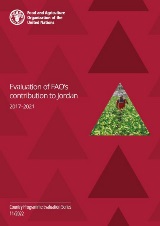
Evaluation of FAO’s contribution to Jordan 2017–2021
15/11/2022
The Jordan country programme evaluation covered the period 2017–2021. The evaluation assessed FAO's strategic positioning, operational and organizational capacity, contributions, partnerships and normative values.
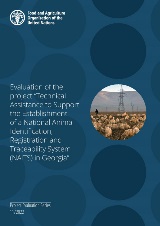
Evaluation of the project “Technical Assistance to Support the Establishment of a National Animal Identification, Registration and Traceability System (NAITS) in Georgia”
08/11/2022
This evaluation aimed to guide future actions and serve as an input to improve the implementation of the follow-up project. This evaluation presents strategic recommendations and lessons to maximize the institutionalization and appropriation of the project’s results by stakeholders and disseminate information to authorities that could benefit from it.
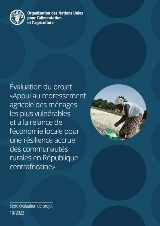
Evaluation of the project "Support for the agricultural revival of the most vulnerable households and the revival of the local economy for increased resilience of rural communities in the Central African Republic"
02/11/2022
The project is consistent with policies and programs to strengthen food and nutritional security and fits well into the humanitarian response as a whole. It has enabled many households to benefit from improved seeds and agricultural tools through direct distributions and seed fairs. It has also enabled many groups to restart their breeding activity. (French only)
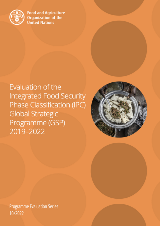
Evaluation of the Integrated Food Security Phase Classification (IPC) Global Strategic Programme (GSP) 2019–2022
10/10/2022
The evaluation reviewed the strategic direction and performance of the programme from 2019 to 2022 and makes recommendations for the future direction of the GSP in its next phase in 2023. The report explores the use and utility of the IPC, its governance, the adaptive capacity within the programme, and how equity and gender are addressed in IPC analyses.
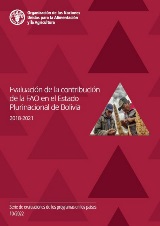
Evaluation of FAO’s country programme in Bolivia, 2018–2021
10/10/2022
This evaluation was carried out in order to provide inputs for the preparation of the new CPF by assessing the most relevant aspects of the FAO program in Bolivia during the period under review, and to provide recommendations to strengthen the strategic relevance of FAO in the country. (Spanish only)
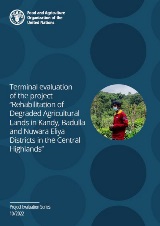
Terminal evaluation of the project “Rehabilitation of Degraded Agricultural Lands in Kandy, Badulla and Nuwara Eliya Districts in the Central Highlands”
10/10/2022
The terminal evaluation found that the project generated relevant planned and unplanned outcomes including spontaneous dissemination of project models and demand for replication and use of participatory land use development plans as national model for village level resource planning.
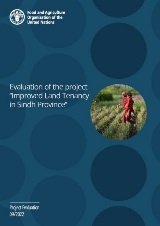
Evaluation of the project "Improved Land Tenancy in Sindh Province"
05/10/2022
The project aims at contributing to responsible land and water governance in Sindh Province and helping its government and land users to address challenges they face regarding land tenure, food security and natural resources management. The evaluation found that the project generated benefits in the domain of civic governance but not in the domain of official governance.
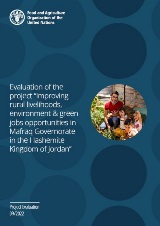
Evaluation of the project “Improving rural livelihoods, environment & green jobs opportunities in Mafraq Governorate in the Hashemite Kingdom of Jordan”
05/10/2022
The evaluation looked into accountability issues but also sought to document lessons, identify good practices and challenges that can inform the design and implementation of follow-up or similar projects in innovative waste disposal techniques and green jobs in order to achieve positive economic, environmental and social outcomes.
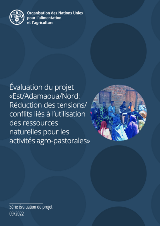
Evaluation of the project “East/Adamaoua/North: Reduction of tensions/conflicts related to the use of natural resources for agro-pastoral activities”
05/10/2022
The project was implemented by FAO and the International Organization for Migration (IOM) in coordination with the Government of Cameroon, in the border regions with the Central African Republic, Chad and Nigeria. The project aimed to reduce conflicts related to transhumance and agro-pastoral practices in Cameroon. (French only)
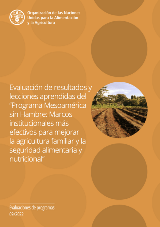
Evaluation of results and lessons learned from the "Hunger-Free Mesoamerica Programme: More effective institutional frameworks to improve family farming and food and nutritional security"
29/09/2022
The Hunger-Free Mesoamerica Program (MSH) is a regional cooperation initiative, with a total budget of 15 million dollars and a duration cycle of eight years (2015-2022). The evaluation identifies numerous experiences with learning potential, among which the complementarity with other FAO interventions and other donors, the regional modeling of sectoral policy instruments, SSTC experiences among the participating countries stand out. (Spanish only)
